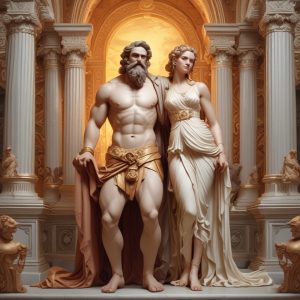Aphrodite & Hephaestus: A Divine Mismatch

In Greek mythology, the union of Aphrodite, the radiant goddess of love and beauty, and Hephaestus, the ingenious but unloved god of fire and craftsmanship, stands as one of Olympus’s most turbulent tales. Born from sea foam after the Titan Cronus castrated Uranus, Aphrodite captivated gods and mortals alike with her allure. Hephaestus, however, faced hardship from birth—cast off Mount Olympus by Hera, his mother, for his lameness. Forged in volcanic fires, he honed unmatched skill in metalwork, creating breathtaking weapons and divine artifacts.
To prevent rivalry among the gods over Aphrodite’s hand, Zeus arranged her marriage to Hephaestus, believing the union would pacify tensions. Though Hephaestus adored his bride, Aphrodite resented the match, finding his soot-streaked appearance and labor-driven life unworthy of her splendor. Their marriage was loveless, and Aphrodite sought passion elsewhere, most famously with Ares, the god of war.
Hephaestus, aware of her infidelity, crafted a cunning trap. He forged an unbreakable golden net, thin as spider silk, and draped it over their bed. When Aphrodite and Ares next met in secret, the net ensnared them mid-embrace. Hephaestus summoned the Olympians to witness the scandal, demanding restitution for his humiliation. The gods, however, erupted in laughter at the spectacle—Apollo and Hermes quipped they’d gladly trade shame for such a lover.
Though Zeus refused to repay Hephaestus’s bridal gifts, Poseidon negotiated Ares’s release, promising compensation. The incident strained relations among the gods, yet Aphrodite continued her affairs, bearing children with Ares (like Eros) and others. Hephaestus, meanwhile, channeled his anguish into creation, crafting Zeus’s thunderbolts, Achilles’ armor, and Pandora herself.
Their myth reflects themes of beauty versus labor, desire versus duty, and the pain of unrequited love. Aphrodite embodies fleeting passion and vanity, while Hephaestus symbolizes resilience and artistry born from suffering. Though mismatched, their story underscores the complexity of divine relationships—where power, pride, and vulnerability intertwine.
Even today, their legacy endures: Aphrodite as a symbol of irresistible allure, and Hephaestus as the patron of those who transform struggle into mastery. Together, they remind us that even gods cannot escape the chaos of the heart.